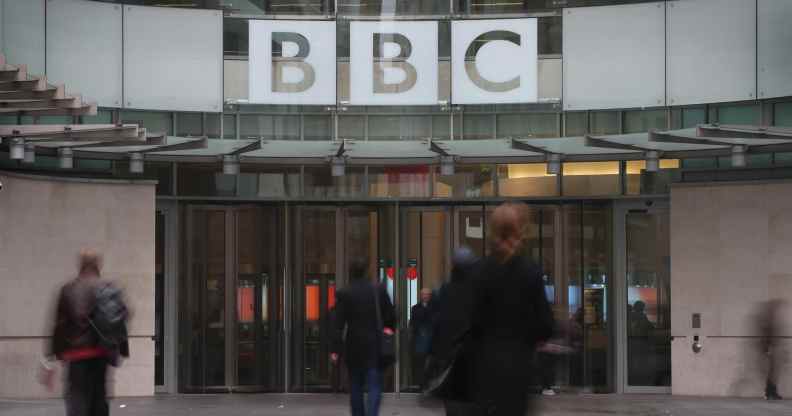BBC finally apologises for airing ‘sickening’ homophobic hate on Arabic news channel

BBC Broadcasting House, where the BBC Arabic service is produced (Peter Macdiarmid/Getty)
The BBC has apologised after repeatedly broadcasting “sickening” homophobic comments completely unchallenged on its Arabic news channel in 2020.
The taxpayer-funded BBC Arabic service sparked outrage by airing multiple homophobic slurs on BBC Trending, a daily programme which reaches 42 million people across the Arab world and can be viewed online in the UK.
Bigoted outbursts from viewers – all uncontested and shared without question – included blaming homosexuals for spreading COVID, calling gay men “deviants” who should be jailed for life and branding the Pride flag a “sign of moral decline”.
The BBC’s lapse in judgement was highlighted by veteran LGBT+ campaigner Peter Tatchell, who said: “At taxpayer’s expense, BBC Arabic has given a platform to homophobic hate speech.
“Its presenters publicised sickening denunciations of LGBT+ people, without any dissent or criticism. Their reports colluded with bigotry.
“They are fuelling anti-LGBT+ prejudice across the Arab world and contributing to the toxic hate that leads to LGBT [people] living in fear of discrimination and violent attack.”
One episode in January 2020 covered the arrest of “two homosexuals” in Mauritania, who were thought to have taken part in a “secret gay wedding” at a birthday party.
A viewer’s tweet, read out by the presenter, said: “If it was up to me I would have sentenced those two for life in prison.”
Another said: “The deviant should be put under the care of a psychiatrist,” while a third commented: “The residents of the neighbourhood where this moral catastrophe happened are to blame.”
BBC admits it failed to meet its own standards
After being caught out, a BBC spokesman admitted: “These broadcasts did not meet our editorial standards and we apologise to our viewers. We will be implementing further staff training with a focus on LGBTQ coverage.”
They said BBC Trending is intended to “reflect debate across the Arab world and examine opposing views on social media”, but conceded that “we should have challenged some of them robustly or provided context around them.”
Tatchell slammed the BBC’s response as “not good enough,” pointing out that the broadcaster has made similar statements after it was previously caught promoting homophobia.
“But nothing changes,” he said. “No staff are sanctioned or sacked. The homophobia continues.
“You would expect the BBC to apologise live on the Arabic service where the homophobic hate speech was broadcast. But as far as I am aware it has not done so. The presenters should be disciplined for gross professional misconduct.”
Tatchell called on Ofcom to “take action”, arguing that because the programmed were “hosted by a UK-based broadcaster, the BBC, and were viewable by people in the UK, Ofcom therefore has jurisdiction”.
Ofcom confirmed to PinkNews however that it does not regulate the BBC World Service, which BBC Arabic is part of, noting that the service is “aimed primarily at users outside the UK”.
Tatchell continued: “BBC Arabic is not the only World Service channel that has faced accusations of anti-LGBT+ bias. There were similar complaints about BBC Persian last December.
“There needs to be a full investigation into the BBC World Service Radio and TV. Both have been repeatedly accused of promoting homophobia. The BBC is not maintaining scrutiny over its output. It has failed to train its overseas service staff in LGBT+ awareness and their obligations under BBC guidelines and UK equality law.”
Ofcom added in its statement: “Ofcom does not regulate the BBC World Service, nor does any part of Ofcom’s Broadcasting Code apply to it. Instead the BBC is responsible for setting out its editorial guidelines and standards.”. All complaints, Ofcom said, should be directed towards the BBC.
This article was updated on 6 July to add comment from Ofcom.

